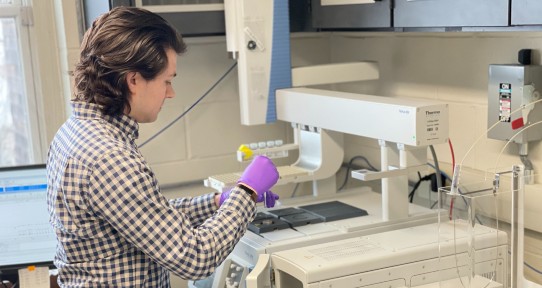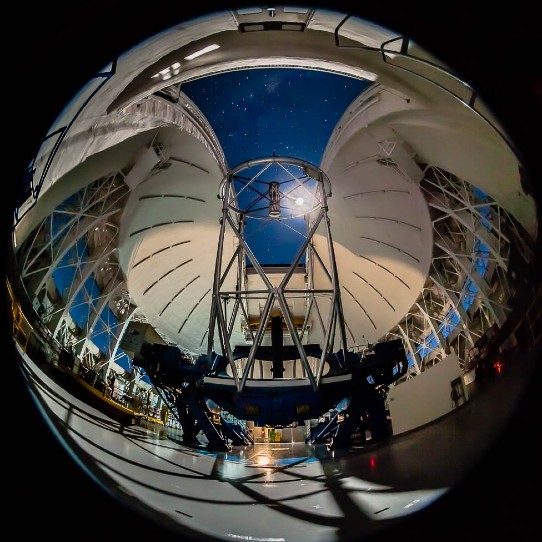Marmie Hess Research grants

Legacy gift fuels research programs spanning land, sea and stars
The Dr. Margaret "Marmie" Perkins Hess Research Grants in Earth, Ocean, Astronomy, and Environmental Sciences were created in 2022, thanks to a generous donation from the estate of the late Marmie Hess. Matthew Ramirez is one of several early career researchers who secured one of these valuable grants to fund his post-doctoral research at the University of Victoria. The marine ecologist had already honed his skills applying cutting-edge molecular isotope techniques in temperate and subtropical marine systems and was eager to broaden his experience. Julia Baum, a UVic President’s Chair and leading researcher on the effects of climate change on coral reefs, had collected a decade’s worth of reef fish samples that Ramirez could analyse using this technique. The Hess research grant provided the perfect opportunity for Ramirez to bring this expertise to Baum’s lab.
By unlocking unique information from amino acids in fish tissue, Ramirez is studying the architecture of coral reef food webs, and how stressors such as climate change amplified marine heatwaves affect—and even rewire—these complex systems.
“Having Ramirez on our team has spurred the advancement of our coral reef food web research,” says Baum. “There can be great synergies between research groups with expertise in one area and post-docs, like Ramirez, who bring a new skill or technique to the group – it’s fertile ground for exciting new discoveries.”
Like much of the research conducted by Baum’s lab group, Ramirez’s work could support the conservation of reef systems in the face of climate change. Coral reefs are the world's most biodiverse, productive, and economically valuable marine ecosystems, making their conservation important to advancing the United Nations Sustainable Development Goals (UN SDGs).
Five post-doctoral research grants awarded
The generous $2.5 million gift from Hess’ estate created a $2 million endowment to fund two graduate fellowships. The remaining half a million dollars funded a total of five post-doctoral research grants.
One of these grants gave earthquake scientist Sarah Jaye Oliva the opportunity to join Ed Nissen's group at the School of Earth and Ocean Sciences. She is investigating a fault line and tectonic plate west of Haida Gwaii, helping local communities better prepare for hazards like earthquakes or tsunamis that any plate movements might cause. As a post-doctoral student with seismology experience, Oliva will supplement the skills of the earthquakes research group.
For early career researchers like Oliva, this type of grant provides opportunities to develop confidence, mentor junior researchers and showcase their abilities to obtain funding.
I'm showing how I can visualize and plan a project and successfully secure funding for that proposal, pulling collaborators together and then executing on that project. That's what future employers are looking for in researchers." - Sarah Jaye Oliva
Astrophysicist Federico Sestito already held a post-doctoral fellowship at UVic before he applied for the Hess research grant. Sestito investigates the formation of galaxies through the analysis of the oldest stars—or "galactic archaeology" as it is sometimes referred to. With this two-year extension to his post-doctoral funding, Sestito will have the exciting opportunity to analyse data from the newly commissioned Gemini High Resolution Optical SpecTrograph (GHOST) in Chile.

Lasting legacy on research
The Hess grants are bolstering already world-class research programs in climate change, seismology, astronomy, sustainability and renewable energy. In fact, it was owing to UVic's research strengths in these areas that donor Marmie Hess included UVic in her legacy plans. For each of the successful post-doctoral fellows, the Hess research grants provide an important steppingstone in advancing their careers, allowing them time to progress from student to professional scientist.
After receiving the Hess grant, Ramirez landed a tenure-track faculty position in coastal and marine biology at the University of North Carolina Wilmington. Although Ramirez is leaving UVic in January 2023 to take up his new position, he will continue collaborating with Baum on this important Hess-funded work over the coming years. And Ramirez leaves behind a legacy of his own through the students he's mentored on this technique and the ultimate impact of this research on our world.
"Philanthropic funding for research provides a very important resource for unencumbered exploration of the planet—for asking questions that might not be easy to fund otherwise," says Ramirez. "This research will advance our understanding of the resilience of coral reef food webs, insight that is essential to conserving these critically important systems."
The impact of the Hess Fellowships is also significant on the research groups who benefit from the fellows' expertise and focus.
Post-doctoral fellows are the engine of a research program. They are sufficiently experienced and have more time to dedicate to the research than faculty members. So post-docs can be the sweet spot for pushing research forward in someone's group." - Sara Ellison, professor in physics and astronomy, UVic
